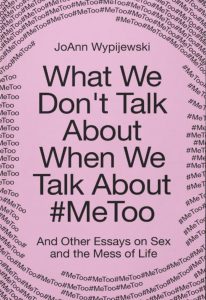What We Don’t Talk About When We Talk About #MeToo
 JoAnn Wypijewski’s book What We Don’t Talk About When We Talk About #MeToo: Essays on Sex, Authority & the Mess of Life is just out from Verso.
JoAnn Wypijewski’s book What We Don’t Talk About When We Talk About #MeToo: Essays on Sex, Authority & the Mess of Life is just out from Verso.
Maybe there is no good time to put out a collection, but this seems to be the worst of times—unless one has been writing about contagion, public health, privatization, the demolition of the welfare state. Unless one has been writing escapist or dystopian fiction or, maybe, transporting poetry. Let’s face it: none of us can be certain of anything, much less the chance that strangers will take another chance, on a book.
Taking a chance, I suppose, is something I’ve been doing my whole writing life. It didn’t seem that way the first time I went to report on a scandal. It was 1997, and I was simply curious that I had read 300-some national and international stories about a young man who had tested positive for HIV, and his sex partners, some of whom had later tested positive, and every story was the same.
The young man was a monster, a “lethal lothario”, “the Devil,” according to tabloid headlines and public officials; the young women were simply victims. Because life really isn’t melodrama, and people, even psychopaths, aren’t cartoon characters, I wagered there had to be more going on here: more to the individuals, more to their circumstances, more to think about – in a time of epidemic; in a small, deindustrialized town not too far from Buffalo, New York, where I grew up; in the assumptions of heterosexuals (big-city and small-town alike) about safety and risk; amidst the criminalization of a public health crisis.
That last was most succinctly represented by Most Wanted-style posters that went up around the region, depicting the man’s face and warning that this twenty-year-old with the dark skin and short braids and “pleasing personality” was carrying the AIDS virus, and anyone who’d had sex with him, or with someone who’d had sex with him, ought to get to a clinic for testing.
The Devil himself was black and a drug dealer, probably in denial about the virus. (There’s no evidence he intended to spread it.) The women were mostly white, teetering working class, vulnerable like him, careless like him. Everyone was acquainted with violence. Everyone was looking for love. Everyone was straining against the limits of their life. And all the press could do (and the criminal legal system) was damn them to prison or damn them with false tears.
I’ve never liked monster stories. I don’t like being made to be afraid. And I wasn’t imagining, back then that they would be so durable, and I so drawn to de-monstering them – more precisely, to thinking about what purpose the monster serves, why the culture is so avid for him/it and, maybe least appreciated of all, how the victim label also dehumanizes those to whom it is attached in a media frenzy.
The story of the lives and desires, the multiple hurts and denials, beneath that HIV panic, “The Secret Sharer”, is the first chapter in my book. It sets the tone for the whole, including the title essay, written twenty years later, as the media could barely keep up with accusations against new monsters, “predators”. ‘What we don’t talk about’ is the red thread that runs through the book. What are the reasons, what are the causes and complications beneath sex-charged stories, the ones we think we all know, which again and again dragoon us into playing judge and jury? And what are the consequences of joining in?
I don’t tell stories about this or that poor victim to arouse a reader’s pity or indignation. That’s not to deny suffering. The world weeps. But the classic victim story so robs a person, a woman especially, of her contradictions, of complex humanity, and it makes little demand on the reader short of indignation.
It assumes the rest of us are in a state of perfect health, and here is the outlier: this scandal, this monster, this victim. Isn’t it disgusting! And, in the US in particular, Lock him up! Or it invokes abstractions – power, patriarchy – which aren’t irrelevant but are typically under-analyzed and, so, distant. Maybe because I take seriously the notion of society and the hope of liberation, I have always been interested in the myriad ways power works, individually, structurally, at the level of consciousness.
The closing essay in the book is not about scandal (not all of the pieces are); it’s an appreciation of James Baldwin. In one of his essays he wrote about the necessity of separating oneself from the “habits of thought [that] reinforce and sustain the habits of power”. That has always resonated with me. It’s the work of a lifetime.
And it does require, I think, having respect for what I call the mess of life – meaning, the real issues in the lives of men and women on any ordinary day, in any ordinary place; their longings and fears, the choices they make, the choices they don’t have; the reality of loss and grief, the trickiness of power and weakness, the possibilities of imagination. Can anyone, can we all, imagine a different way of being?
Scandal typically forecloses that question. It is the question, I’d say the invitation, that runs implicitly through the book.
#
JoAnn Wypijewski is a writer and editor based in New York. From 1982 to 2000, she was an editor at the Nation magazine. She has written for the magazine, as well as for Harper’s, CounterPunch, the New York Times Magazine, the Guardian, and other publications. She is on the editorial committee of the New Left Review. She was the co-editor with Kevin Alexander Gray and Jeffrey St. Clair, of Killing Trayvons: An Anthology of American Violence.
What We Don’t Talk About When We Talk About #MeToo: Essays on Sex, Authority and the Mess of Life
 An exquisite examination of a sexual culture in crisis
An exquisite examination of a sexual culture in crisis
What if we took sex out of the box marked “special,” either the worst or best thing that a human person can experience, and considered it within the complexity of reality? In this extraordinary book, despite longstanding tabloid-style sexual preoccupations with monsters and victims, shame and virtue, JoAnn Wypijewski does exactly that.
From the HIV crisis to the paedophile priest panic, Woody Allen to Brett Kavanaugh, child pornography to Abu Ghraib, Wypijewski takes the most famous sex panics of the last decades and turns them inside out, weaving what together becomes a searing indictment of modern sexual politics, exposing the myriad ways sex panics and the expansion of the punitive state are intertwined.
What emerges is an examination of the multiple ways in which the ever-expanding default language of monsters and victims has contributed to the repressive power of the state. Politics exists in the mess of life. Sex does too, Wypijewski insists, and so must sexual politics, to make any sense at all.
BUY THE BOOK HERE
Category: Contemporary Women Writers, On Writing























